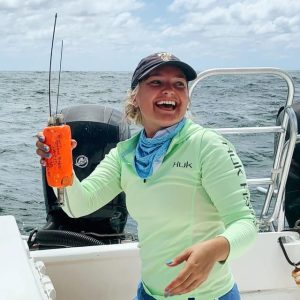|
Getting your Trinity Audio player ready...
|
 How do you collect data to protect critically endangered great hammerhead sharks?
How do you collect data to protect critically endangered great hammerhead sharks?
Erin Spencer — a Ph.D. candidate in the Predator Ecology and Conservation lab — uses special technology that works like a Fitbit.
Even though great hammerheads live right off Florida’s coast, there’s a lot that remains a mystery about these large, highly mobile animals. That’s a problem because the ocean — their home — is changing, getting warmer. To learn how they are responding to these changes, Spencer is investigating how they move, where they go and how they behave. She uses special tags, called biologgers, that attach to the sharks’ dorsal fins and work like a Fitbit — collecting important data on their movement, acceleration and more. Every little bit of information offers better understanding of these sharks.
Spencer is also a science communicator and published a science-focused children’s book, The World of Coral Reefs: Explore and Protect the Natural Wonders of the Sea.
FIU is ranked No. 2 in the world for positive impact on life below water by The Times Higher Education Impact Rankings.





